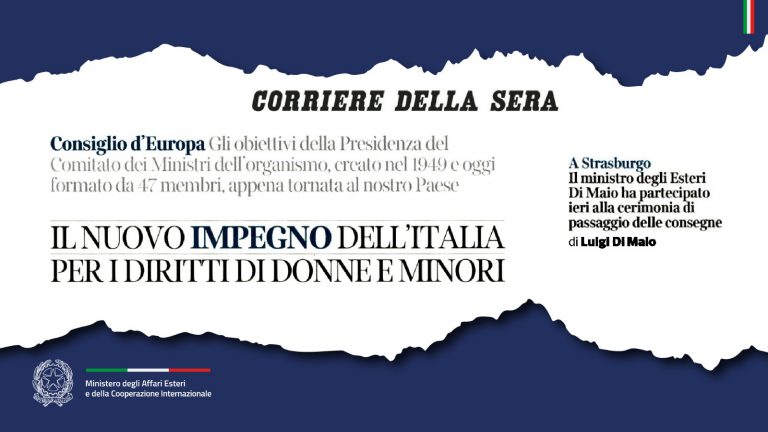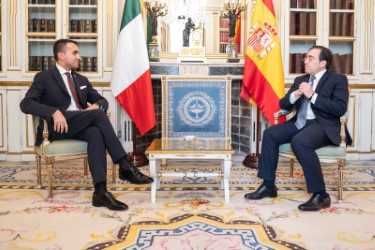The Balkans are a crucial economic market for Italy’s development, within the context of a European integration capable of ensuring stability and cooperation between peoples. This, in brief, is the formula of Italy’s Ostpolitik outlined by Minister for Foreign Affairs Giulio Terzi di Sant’Agata. The economic crisis is also impacting on Slovenia, where a portion of the population has been heavily hit, and recovery measures are having their effect on the political framework. What is Italy’s role as a neighbour and top European trade partner?
The role is a crucial one that can make the difference, given the quality of collaboration and the importance of our economic relations. You are right to point out trade: we are talking about approximately 6.5 billion euro in 2011, i.e. 40% of Italy’s total trade with the 8 Balkans nations. We are also Slovenia’s third largest foreign investor. The Balkans need more economic integration with Europe, and there is no better way to breathe new life into their economies. In that sense, Italy’s relations with Slovenia are a success story that could be a model.
This is the context for President Napolitano’s visit to Slovenia.
The Head of State’s visit, which begins tomorrow, is high level confirmation of the priority consideration that Italy reserves for the Balkans and their growth and gradual integration into the broader European context, along with the opportunities that this region offers our businesses, which are always on the lookout for new markets. It is in this spirit that Italy will present its “Western Balkans Strategy” in Brussels on 19 July, drafted in the conviction that only by overcoming outdated barriers, consolidating national political institutions and cooperating amongst themselves will it be possible for the Balkans to develop credible and sustainable European prospects.
Discussions in Ljubljana will include some important dossiers, such as the high-speed railway networks. Are you confident there will be a convergence of views?
Certainly, because Rome and Ljubljana are like-minded. We are both in search of what could be called a “win-win situation”, which is not only within reach but, in the end, is a natural expectation if the theme of railway infrastructures is confronted at European level. Instead, if short-term interests were to prevail it would hurt everyone involved: what is needed is vision and, I repeat, a European perspective.
The North Adriatic macro-port system also seems a fair way off.
But the meeting of the Committee of Ministers in Ljubljana is close, it’s only a few weeks to 17 September, and that will be an opportunity to present tangible progress in the Trieste-Divaccia and Trieste-Capodistria rail link projects and concrete plans to fully tap the naturally advantageous location of the North Adriatic ports, single market links, and energy and transportation grids. Italy is counting heavily on the Far East markets, and it is in our interests for the goods in transit across Central Europe pass through the Adriatic ports: lower costs means higher trade volumes, not to mention the environmental benefits.
Another item concerns the goods left behind by the exiles. Is what was outlined in the 1983 Rome Accord with Yugoslavia still valid?
I would say that there are still some unresolved issues. We are well aware that Yugoslavia has only paid 17 million dollars, leaving another 93 million still to pay. Work remains to be done on the compensation and restitution of property to the exiles. That said, let me also point out that the real point is not only a financial one, but also a political one.
Are you referring to the theme of minorities?
Of course, the Italian minorities in Slovenia, Croatia and Montenegro, and the Slovenian, Croatian and Albanian-language minorities in Italy are not a problem, but a source of wealth and opportunity, and it is as such that we view them. They give great dynamism to economic and cultural relations between our civil societies. Consistent with that, Italy has always supported the Balkans’ European prospects; this is of no small consequence when confronting the issue of the rights of our minorities in those countries.
Next year Croatia will become the 28th European star. But budget constraints are being felt heavily there too.
That’s true, but for now Zagreb can count on a new perspective. Precisely two days ago the European Commission presented a new proposal for the 2014-2020 financial framework that now includes Croatia. As a Union member, Zagreb will be able to fully partake of new resources and various forms of European funding, such as structural and cohesion funds. In concrete terms we are talking about nearly 14 million euro over seven years.
Italy has worked hard on getting Croatia into the EU. How do you plan to “accompany” Zagreb on this final and certainly not easy leg of its journey toward Brussels?
With the same conviction with which, as an EU founder country, Italy ratified its Accession Treaty in record time. We are Croatia’s top trade partner and a major investor there.
The international community – the United States in particular – are monitoring political events in Serbia after the election of Nikolic. How is Italy behaving?
Last month in Brussels President Nikolic confirmed Serbia’s goal of EU membership, and he reiterated this in meetings with us at government level. We are waiting for the new government to take shape. I am very confident that Serbia will pursue the path of reform and resume its commitment to normalising relations with Pristina, which remains a prerequisite for the launch of accession negotiations. I am planning to make a trip to Belgrade very soon.
Bosnia says it is ready to negotiate with the EU for Accession Country status, but the political situation in very unstable in Sarajevo too.
We mustn’t forget the important progress that country has made in recent months. I am thinking of its approval of budget laws, the census and State Aid. Another major sign is the launch of high level dialogue on the Accession Process. The political situation in Bosnia is complex, but I believe that the conditions exist for keeping reforms at the top of the government’s agenda. Meanwhile, we continue to support the entry into force of its Stabilisation and Association Agreement with the EU, which will be a great help to Bosnia’s economic development and will give it more credibility when it goes knocking on Europe’s doors.
Will it be necessary to have the courage to rewrite Dayton?
You can’t rewrite history. Sometimes it leads us to recognise our errors, but not in this case. The principles remain valid. I do not think that the peaceful co-existence of separate ethnic groups and religions can be called into question. The framework known as “two entities and three peoples” also remains valid. Italy has fought hard to reinforce the EU’s presence in the country, and to ensure that the conditions for closing the Office of the High Representative are met soon.
Paradoxically at this point it seems that Kosovo is the most “peaceful” area.
Kosovo’s institutions should be doing their part in terms of security and, in fact, the signs are positive. International supervision will be formally brought to an end in September, with Italy’s convinced support. The EULEX mission will continue, however, in matters of customs, justice and the public order, with the aim of fostering Kosovo’s adaptation to European standards. We expect Pristina to work at maintaining the dialogue with Belgrade being facilitated by Europe, since Europe needs both of them.



